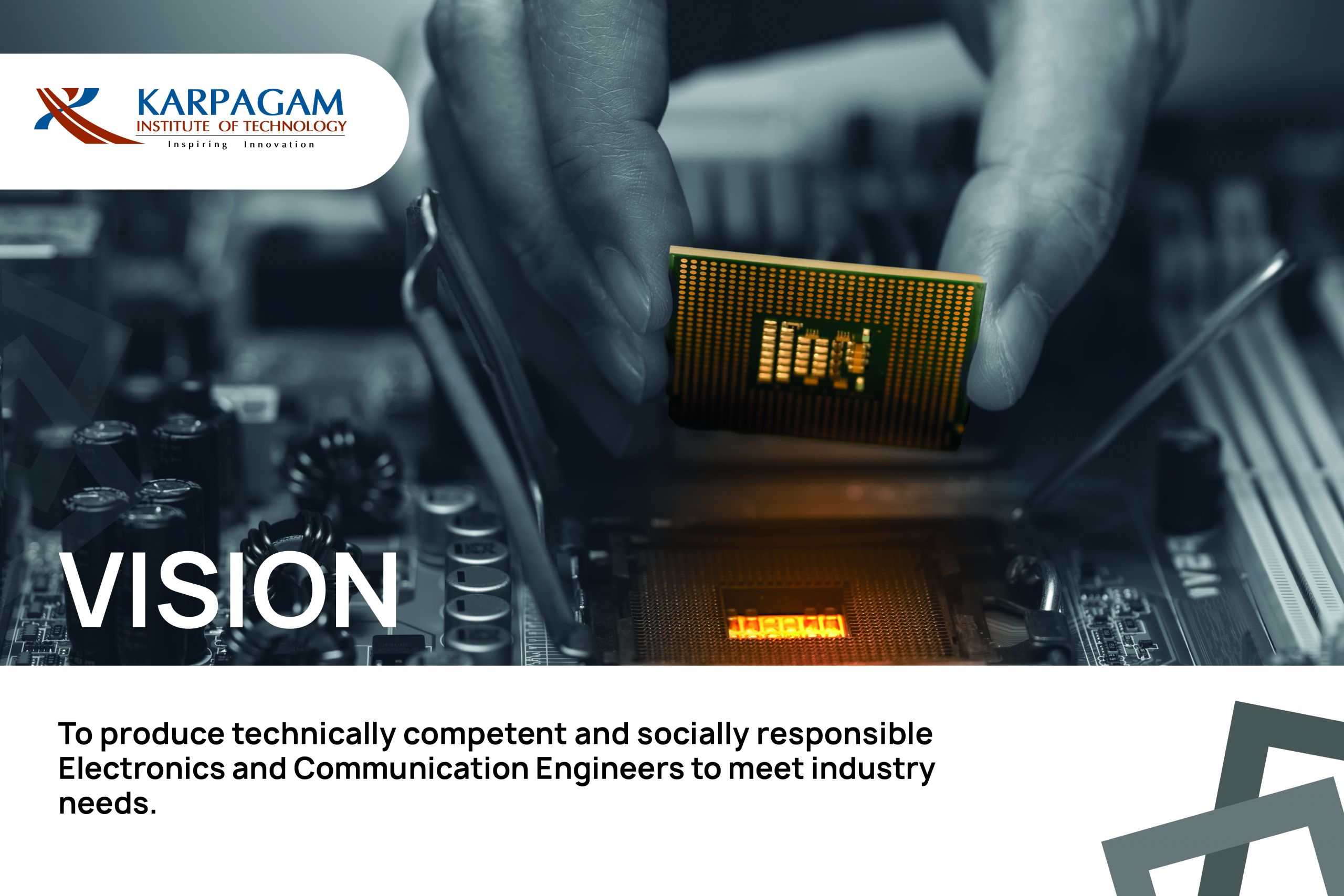
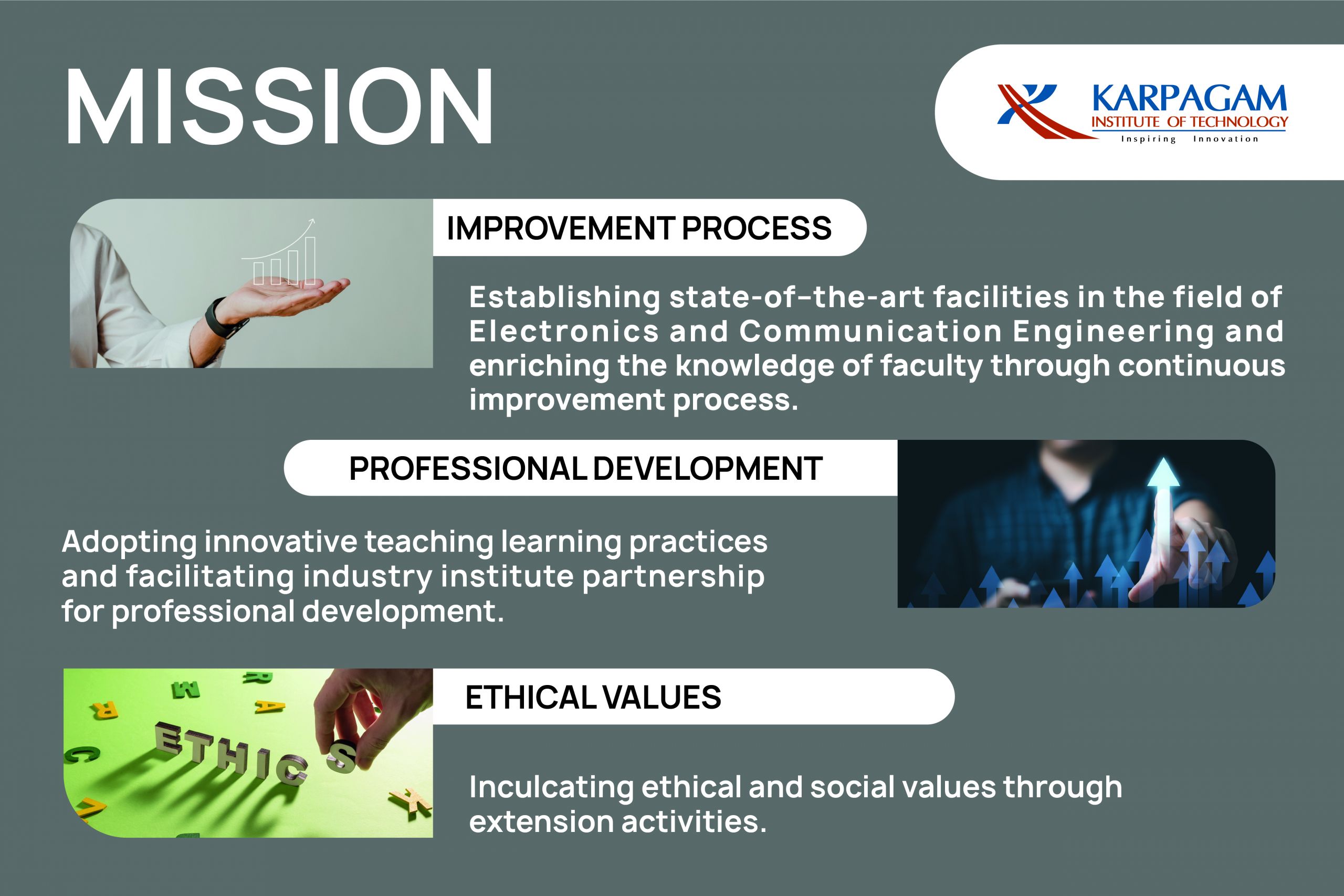
- Establishing state-of–the-art facilities in the field of Electronics and Communication Engineering and enriching the knowledge of faculty through continuous improvement process.
- Adopting innovative teaching learning practices and facilitating industry institute partnership for professional development.
- Inculcating ethical and social values through extension activities.
- PEO1: Graduates will excel in their chosen technical profession in Electronics and Communication Engineering or interdisciplinary areas.
- PEO2: Graduates will demonstrate conceptual, practical and analytical knowledge in the field of Electronics and Communication Engineering.
- PEO3: Graduates will engage in life-long learning and team work with ethical values in their Professional career.
PROGRAM OUTCOMES
- PO1: Engineering knowledge: Apply the knowledge of mathematics, science, engineering fundamentals, and an engineering specialization to the solution of complex engineering problems.
- PO2: Problem Analysis: Identify, formulate, review research literature, and analyze complex engineering problems reaching substantiated conclusions using first principles of mathematics, natural sciences, and engineering sciences.
- PO3: Design/development of solutions: Design solutions for complex engineering problems and design system components or processes that meet the specified needs with appropriate consideration for the public health and safety, and the cultural, societal, and environmental considerations.
- PO4: Conduct investigations of complex problems: Use research-based knowledge and research methods including design of experiments, analysis and interpretation of data, and synthesis of the information to provide valid conclusions.
- PO5: Modern tool usage: Create, select, and apply appropriate techniques, resources, and modern engineering and IT tools including prediction and modeling to complex engineering activities with an understanding of the limitations.
- PO6: The engineer and society: Apply reasoning informed by the contextual knowledge to assess societal, health, safety, legal and cultural issues and the consequent responsibilities relevant to the professional engineering practice.
- PO7: Environment and sustainability: Understand the impact of the professional engineering solutions in societal and environmental contexts, and demonstrate the knowledge of, and need for sustainable development.
- PO8: Ethics: Apply ethical principles and commit to professional ethics and responsibilities and norms of the engineering practice.
- PO9: Individual and team work: Function effectively as an individual, and as a member or leader in diverse teams, and in multidisciplinary settings.
- PO10: Communication: Communicate effectively on complex engineering activities with the engineering community and with society at large, such as, being able to comprehend and write effective reports and design documentation, make effective presentations, and give and receive clear instructions.
- PO11: Project management and finance: Demonstrate knowledge and understanding of the engineering and management principles and apply these to one‘s own work, as a member and leader in a team, to manage projects and in multidisciplinary environments.
- PO12: Life-long learning: Recognize the need for, and have the preparation and ability to engage in independent and life-long learning in the broadest context of technological change.
- PSO1: Analyze, Design, Simulate and Integrate Electronic Circuits and Systems for given specifications.
- PSO2: Apply the technical knowledge to solve issues in the areas like Signal Processing, Communication, VLSI Design, and Embedded Systems.
| Sr.No | Name of the Laboratory | Name of the Important Equipment |
|---|---|---|
| 1. | Analog and Digital Laboratory | 1.CRO (30MHz)
2.Signal Generator /Function Generators (3 MHz) |
| 2. | Integrated Circuits Laboratory | 1.CRO (Min 30MHz) 2. Signal Generator /Function Generators (2 MHz) 3. Dual Regulated Power Supplies (0-30) 4.Digital LCR Meter 5. Digital Multimeter 6. Standalone desktops PC 7.SPICE Circuit Simulation Software (any public domain or commercial software) 8. Power transistors, Potentiometer, A/D and D/A convertors, LEDs, Op Amp, LM301. |
| 3. | Communication Systems Laboratory | 1.Kits for Signal Sampling, TDM, AM, FM, PCM, DM and Line Coding Scheme, Error control code 2. CROs 3.MATLAB/ SCILAB or equivalent software package for simulation experiments 4.PCs 5.Trainer kit for carrying out LED and PIN diode characteristics, Digital Multiimeter, optical power meter 6.Trainer kit for analyzing Analog and Digital link performance, 2 Mbps PRBS Data source, 10 MHz 7.Signal generator, 20 MHz Digital storage Oscilloscope 8. Kit for measuring Numerical aperture and Attenuation of fiber 9. MM/SM Glass and plastic fibber patch chords with ST/SC/E2000 connectors 10. LEDs with SC / E2000 receptacles – 650 / 850 nm ST 11. Pin PDs with ST / SC / E2000 receptacles – 650 / 850 nm 12. Microwave test Bench at X band to determine Directional coupler characteristics 13. Microwave test Bench at X band and Antenna turn table to measure Radiation pattern of Horn antenna, Horn Antennas 14. Microwave test Bench at X band to determine VSWR for Isolator and Circulator, VSWR meter,Isolator, Circulator, E Plane Tee, H plane Tee 15. Microwave test Bench at X band, Variable attenuator, Detector and 20 MHz Digital / Analog Oscilloscope. 16. Digital Communications Teaching Bundle (LABVIEW/MATLAB/Equivalent software tools). 17. Transmit/receive pair of NI USRP-2920 transceivers (50 MHz to 2.2 GHz). |
| 4. | Signal processing Laboratory |
1.Xilinx or Altera FPGA board 2.Cadence/MAGMA /Tanner or equivalent software package 3.PCs with Fixed / Floating point DSP A/D and D/A Interfacing card 4.Signal Generators (1MHz) 5. MATLAB/ SCILAB or equivalent software package for simulation experiments 6. Desktop systems |
| 5. | Embedded System Laboratory | 1.8086 Microprocessor Trainer kit with power supply 2.8085 Microprocessor Trainer kit with power supply 3.Traffic light control Interfacing card compatible with 8086 & 8051 4.Serial and Parallel Interfacing card compatible with 8086 & 8051 kits 5.A/D and D/A Interfacing card compatible with 8086 & 8051 kit 6.Printer Interfacing card compatible with 8086 & 8051 kits 7.Keyboard & Display Interface board compatible with 8086 & 8051 kits 8. Embedded trainer kits with ARM board 9.Embedded trainer kits suitable for wireless communication 10. Adequate quantities of Hardware, software and consumables. |
| 6. | Communication Network Laboratory | 1.Network simulator NS2 2.PCs |
| S.No | Facility Name | Details |
|---|---|---|
| 1 | System Design Laboratory | SYNCHRO-Transmitters & Receiver, Solar PV module, PV Grid Inverter , Solar Battery 40Ah PLC Based Variable Frequency Drive(VPAT33) \Trainer kit, Pressure Trainer Kit, LVDT Trainer kit, LDR/Photo Diode Kit, RTO Trainer kit, STRAIN Trainer kit. Process control timer |
| 2 | E-Yantra Innovation laboratory |
Fire Bird V ATMEGA 2560 Robot Zigbee Modules 100m Range Kinect (Xbox) Sensor Sharp GP2D120C Infrared Range Sensor (4cm To 30 Cm) Max BOTIX Ultrasonic Range Sensor Accelerometer and GPS Interfacing Module, Raspberry-Pi L3G42003 Axis Digital Gyroscope |
| 3 | Texas Innovation laboratory |
BOOSTER PACK CC1101(WIRELESS) TPS62150A ULN2003A TPS562209 LM3488 Advanced Emulation Booster Pack Tiva Launch Pad Msp430 Launch Pad |
| 4 | NPTEL Videos | Videos for Various courses available |
| 5. | Printed Circuit Designing | Lead, Gun, Board, Desolder pump and other discrete components |
| 6. | TASM/ MASM Software |
Platform of system design for development of microprocessor/microcontroller programming |
| 7. | Computer Networking | Router Switches |
| 8. | Wireless Local Area Network Design | OPNET IT Guru Academic Edition |
| 9. | RAM Circuits Simulation and Layout Generation | Microwind DSCH |
| Class | Strength | Boys | Girls |
|---|---|---|---|
| II –ECE –A | 63 | 38 | 25 |
| II –ECE –B | 62 | 46 | 16 |
| III–ECE –A | 48 | 36 | 12 |
| III-ECE-B | 48 | 33 | 15 |
| IV-ECE | 59 | 40 | 19 |
| TOTAL | 280 | 193 | 87 |
| Batch | Graduation(%) |
|---|---|
| 2022 | 100% |
| 2021 | 94% |
| 2020 | 98% |
| 2019 | 54% |
| Batch | Strength | Placement (%) | Maximum CTC in LPA |
|---|---|---|---|
| 2022 | 27 | 93% | 7.0 |
| 2021 | 53 | 92% | 4.0 |
| 2020 | 77 | 84% | 4.0 |
| 2019 | 96 | 79% | 4.0 |
| S.No. | Date | Name of the Students | Name of the events/ Contests |
Name of the Institution | Status |
|---|---|---|---|---|---|
| 1 | Jan-Apr 2022 | Subhasri. R | NPTEL Online Certification – Sensors and Actuators | Indian Institute of Science Banglore | Completed |
| 2 | Jan-Apr 2022 | Ajithkumar. M | NPTEL Online Certification – Digital Electronic Circuits | IIT, Kharagpur | Completed |
| 3 | Jan-Apr 2022 | Devatharshini.S .A | NPTEL Online Certification – Sensors and Actuators | Indian Institute of Science Banglore | Completed |
| 4 | Jan-Apr 2022 | Athulya.A .S | NPTEL Online Certification – Sensors and Actuators | Indian Institute of Science Banglore | Completed |
| 5 | Jan-Apr 2022 | Swathi. P | NPTEL Online Certification – Digital Electronic Circuits | IIT,Kharagpur | Completed |
| 6 | Jan-Apr 2022 | Loganath. J | NPTEL Online Certification – Digital Electronic Circuits | IIT,Kharagpur | Completed |
| 7 | Jan-Apr 2022 | Srinivasan. K | NPTEL Online Certification – Digital Electronic Circuits | IIT,Kharagpur | Completed |
| 8 | Jan-Apr 2022 | Nithiya Sri. R | NPTEL Online Certification – Sensors and Actuators | Indian Institute of Science Banglore | Completed |
| 9 | Jan-Apr 2022 | Haripriya. B | NPTEL Online Certification – Programming in Java | IIT,Kharagpur | Completed |
| 10 | Jan-Apr 2022 | Nishalini. S | NPTEL Online Certification – Programming in Java | IIT,Kharagpur | Completed |
| 11 | Jan-Apr 2022 | Amritha. J.K | NPTEL Online Certification – Programming in Java | IIT,Kharagpur | Completed |
| 12 | Feb-Mar 2022 | Sanjay Kumar. R | NPTEL Online Certification – Innovation by Design | IIT,Bombay | Completed |
| 13 | Jan-Apr 2022 | Karthick Raja. P | NPTEL Online Certification – Digital Electronic Circuits | IIT,Kharagpur | Completed |
| 14 | Jan-Apr 2022 | Vibitha. S | NPTEL Online Certification – Sensors and Actuators | Indian Institute of Science Banglore | Completed |
| 15 | Jan-Apr 2022 | Priya. B | NPTEL Online Certification – Sensors and Actuators | Indian Institute of Science Banglore | Completed |
| 16 | Jan-Apr 2022 | Nivetha. P | NPTEL Online Certification – Sensors and Actuators | Indian Institute of Science Banglore | Completed |
| 17 | Jan-Apr 2022 | Harsha. B | NPTEL Online Certification – Biophotonics | IIT,Kharagpur | Completed |
| 18 | Jan-Apr 2022 | Kaviya. R | NPTEL Online Certification – Digital Electronic Circuits | IIT,Kharagpur | Completed |
Labs
- Electronics Lab
- Microprocessors & Microcontrollers Lab.
- Analog & Digital Communication Lab.
- Optical & Microwave Lab.
- Computer Networks Lab.
Projects
- Efficient AGRO farm Irrigation System Maintenance Emphasizing Failure Detection and Energy Conservation
- Intelligent Control of Vehicle using Brain Computer Interface
- The Geographical Location based Energy Aware Routing for Wireless Sensor Networks
- An Autonomous Networking Military Security System using Self Reconfigurable Robot
- Power Allocation based Green Cognitive Mobile Network in Smart Grid Technologies
- Development Of Measuring Device In Automobiles During Fueling
- Design And Development Of Wireless Printer Adapter Using Raspberry Pi Microcontroller
- Design and Development of Biometric Voting Machine.
- ECE students have uploaded their project demonstration in youtube for Texas Instruments Innovation Challenge -2015. The link is https://www.youtube.com/watch?v=ifaKOxVNWtM&feature=youtu.be
- V.P.Vignesh have submitted two projects in “Tamil Nadu State Council for Science and Technology ”for best project award on 18.08.2015.
- Ebenezer and his team received Rs.8, 000 /- cash prize Scholarship for best project from IEEE Madras Section.
STUDENT ACHIEVEMENT
Apart from academics our students groomed in all dimensions that is required to compete in fast growing technological world. Here we spot few of our achievements.
- Anandapadmanaban K of Final Year ECE was awarded “ISTE Chapter –Best Student Award -2019”
Innovation and novelty does not lay in words. Our students filled and published Patents for their work.
- Smart Glucometer by Anandapadmanaban K.
- Polyvalent Antigravity Robotic Vaccum Cleaner by R.Monica and S.Devisathya.
Our students Padma Prabha SSG and David Conqueror achieved 1st and 2nd place in Drishiti contest by Texas Instrument.
Innovations of our students were displayed in National Science and Technology Fair 2019.

Our students proved their excellence in extra -curricular and bagged with medals.
- Sudharshan S of final year ECE won Second Place in Inter Zone Athletic Meet (State Level) for the year 2019-2020 in the event 20 km walk
- Vinitha of third year ECE won Second Place in Inter Zone Athletic Meet (State Level) for the year 2019-2020 in the event 5 km walk
MOU
- Caliber Embedded Technologies India Pvt. Ltd, Coimbatore
- Thick India, Coimbatore
- Wax Wing Automation , Sivakasi
- Fiabilite Network Solution Pvt, Ltd, Bangolore.
- Texas Instrumentation

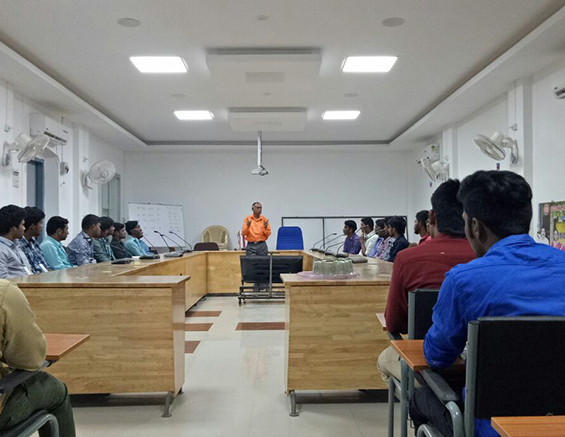
Association Clubs
- ELECTRONICS CLUB – Make students to design basic electronics circuit and get familiar with PCB design.
- E-YANTRA CLUBTo – create the next generation of embedded systems engineers with a practical outlook to help and provide practical solutions to real world problems.
- VLSI CIRCUIT DESIGN CLUB – The club envisages the microelectronics and embedded system study in following broad activities considering the process of designing, modeling, simulation, circuit fabrication and evaluation.
- NATURE CLUB – Supports & motivate students to develop eco- friendly environment.
- PERSONALITY DEVELOPMENT CLUB – Co-ordinates various activities to enhance the students personality and concentrates to make them employable as well as to face the real world with spirit.
Value-added Courses
In addition to university curriculum. We supplement the curriculum to make students better prepared to meet industry demands as well as develop their own interests and aptitudes.
Students are provided with Value-added Courses on
- Arduino and ARM LPC2148 based Embedded System Design.
- Basics of Electronics(Activity Based Learning )
- Single Board Heater System
- SCILAB based Image Processing
- e-SIM
- expEYES
Apart from value added courses we organise seminars, workshops, hands on training and Industrial visit. A glimpse of the events is here
- Hands on training on “Smart Phone Troubleshooting”
- Workshop on “Image Processing using MATLAB”
- Guest Lecture on ”Communication and Signal Processing”
- Hands on Training on “Embedded System Design”
- Workshop on “Circuit Simulation using PSpice and MULTISIM”
- Hands on Training on “ PCB Design using ORCAD”
As curriculum extension activity we established e-Yantra laboratory which provides a pathway for Robotics education and Robotics based application development.
Texas Powered Instrument Embedded System lab is another path of extension activity.
- Six teams submitted their innovations to DST and Texas Instruments India Innovation Challenge design Contest 2019.
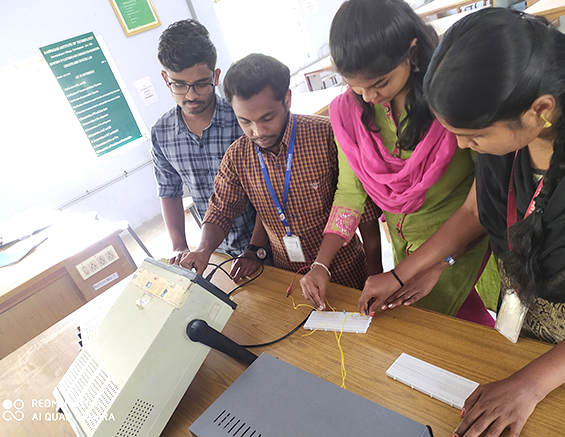
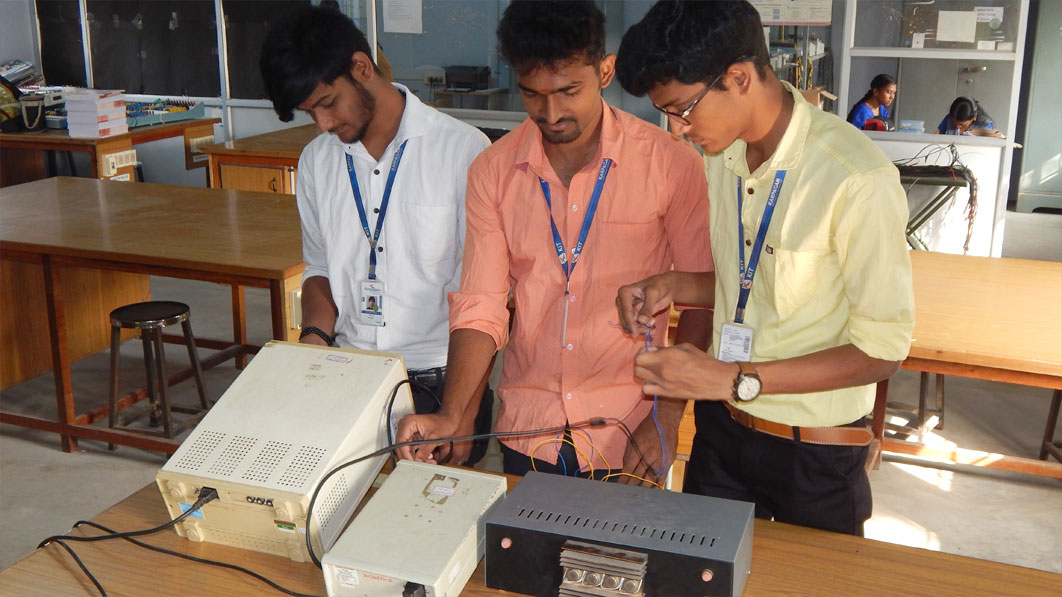
| S.No. | Course Name | Name of the Faculty | Topic | Link for the Video |
|---|---|---|---|---|
| 1 | Linear Integrated Circuits | Dr.N.Suma | Introduction to LIC | youtube.com/channel/UCqFc_z_qTaNxyFuXAojqB0Q |
| 2 | Medical Electronics | Dr.S.Gopinath | Recent Trends in Medical Instrumentation | |
| 3 | Intellectual Property Rights | |||
| 4 | Anatomy of Heart & ECG | |||
| 5 | Introduction to Wireless Networks | |||
| 6 | EMG & EEG WORKING PRINCIPLES | |||
| 7 | ECG DEMO & PCG | |||
| 8 | PCO2 Measurement and Colorimeter | |||
| 9 | Blood Cell Counters | |||
| 10 | Respiratory Rate Measurement | |||
| 11 | Cardiac Output Measurement | |||
| 12 | Principles of Management | Dr.S.Syed Jamaesha | Design Thinking of Electronics | |
| 13 | Electromagnetic Fields | Dr.T.Manojkumar | Laplace Equation | |
| 14 | 1D, 2D, 3D Integration | |||
| 15 | Gradient, Divergence | |||
| 16 | Curl, Stokes Theorem | |||
| 17 | Coulomb’s law | |||
| 18 | Electric Field Intensity | |||
| 19 | Problems on EFI | |||
| 20 | Gauss’s Law | |||
| 21 | Boundary conditions | |||
| 22 | Continuity Equation | |||
| 23 | Conductors, Dielectrics | |||
| 24 | Capacitor | |||
| 25 | Electronic Circuits I | Mr.A.G.Paranthaman | Basics of electronic devices | |
| 26 | Microprocessors and Microcontroller | Ms.S.Madhumitha | Architecture of 8051 micro controller | |
| 27 | VLSI Design | Mr.E.Veeraboopathy | Electronic devices: PN Junction diode | |
| 28 | Circuit Analysis | Mr.S.Pragadeswaran | Probability Part 1 | |
| 29 | Signals and Systems | Mrs.V.Pavithra | Types of signals | |
| 30 | Microprocessors and Microcontroller | Mr.S.Jeniton | EC8691 Microprocessors and Microcontrollers Introduction |
| S.No. | Name of the Faculty | Blog link |
|---|---|---|
| 1 | Dr.N.Suma | https://sumasivaravi.blogspot.com |
| 2 | Dr.S.Gopinath | https://gopinathecekit.blogspot.com |
| 3 | Dr.S.Syed Jamaesha | https://drsyedjamaesha.blogspot.com |
| 4 | Dr.T.Manojkumar | https://codinginhdl.blogspot.com |
| 5 | Mr.A.G.Paranthaman | https://paranthamangopal.blogspot.com |
| 6 | Ms.S.Madhumitha | https://madhumitha28.blogspot.com |
| 7 | Mr.E.Veeraboopathy | https://veeraboopathy.blogspot.com |
| 8 | Mr.S.Pragadeswaran | https://link.medium.com/vLRHvvWwcnb |
| 9 | Mrs.V.Pavithra | https://pavithrahariharan.blogspot.com |
| 10 | Mr.S.Jeniton | https://jenitton.blogspot.com |
